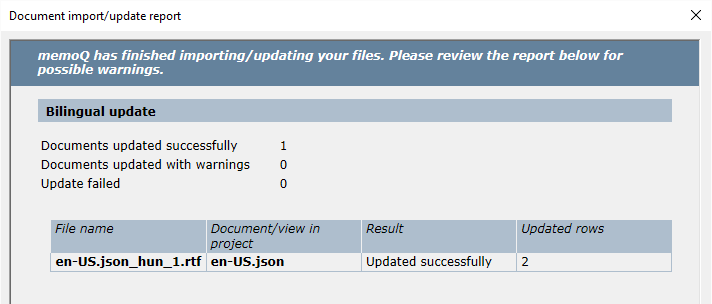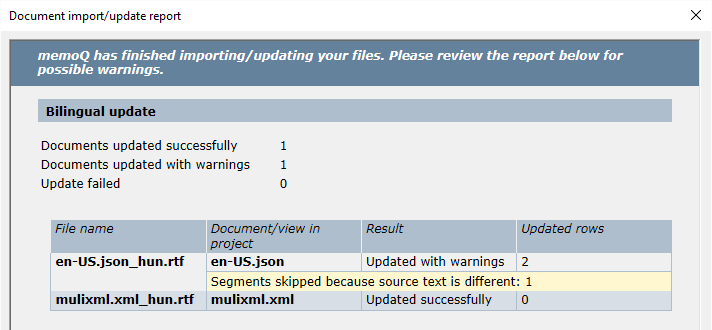Document import/update report
This window may appear after memoQ finishes updating or reimporting documents in the project. If all goes well, you won't see it; the Document import/update report means a problem or two.
The Document import/update report window usually shows the number of documents memoQ updated, imported, or reimported.
Most of all, it lists the errors that occurred, so that you can learn details about what went wrong with the import or update.



Warnings and error messages
Here are the most likely warnings you may get when you update a document in a memoQ project from a bilingual file.
- Different number of rows: The document was updated, but memoQ couldn't match all segments to the segments in the bilingual file. Normally, there isn't much you can do. But you may want to check if you updated the right version of document from the right version of bilingual file.
- Segments skipped because source text is different: In the bilingual file, the source text was edited in some segments. If you need to update these segments, start importing the bilingual file again. In the Document import options window, clear the Do not update if source segment is different check box.
- Segments skipped because of divergent split/joins: In most cases, you export bilingual files to have them edited in another tool, and then import them back to update your document. You get this warning when segments were split or joined in the project - and, at the same time, the same segments were split or joined differently in the other tool. memoQ can't match these segments together. If you need to preserve the edits for all the segments from the bilingual file, do this:
- Create a new project.
- Import the bilingual file as a new document.
- Add the same translation memory to the project.
- Confirm and update all segments to the translation memory.
- Return to your original project.
- Get the edited translations for the problem segments from the translation memory.
- Segments updated with tag warnings: The bilingual files you imported contained malformed or misplaced inline tags. Use Resolve errors and warnings to check through tag warnings in the document.
- Segments skipped because row is locked or read-only: If you need the edits in those segments, unlock all segments, and update your document again. If the project is an online project that was checked out in a read-only mode: Check out the project properly. But if it's an online project, you may not have the permission to update documents in it. If this is the case, contact your project manager.
- Invalid tags in updated target text.: As a result of the update, the document has tags that shouldn't be there, or some tags were misplaced. Use Resolve errors and warnings to check through tag warnings in the document. You may need to run QA first.
- Source segment in RTF file is different from document in project.: In the bilingual file, the source text was edited in some segments. If you need to update these segments, start importing the bilingual file again. In the Document import options window, clear the Do not update if source segment is different check box.
- Target text contains tag that is not formatted as mqInternal.: Normally, inline tags in bilingual Word or RTF documents are formatted with the mqInternal style. The bilingual document you're trying to import or update doesn't contain this formatting. If you need to update the document, start importing the bilingual file again. In the Document import options window, clear the Tags must have mQInternal style check box. (Normally, the latest versions of memoQ don't complain about this.)
- Segment was edited in the RTF file, but it is locked in project (not updated).: If you need the edits in those segments, unlock all segments, and update your document again.
- There are extra tags in updated target content: There are more tags in the bilingual file than in the document in your project. Use Resolve errors and warnings to check through tag warnings in the document. You may need to run QA first.
When you try importing source document, you may get errors that appear in this same window. To learn more about an error, click the Details link next to it. A regular memoQ warning appears. In that window, click More to get more details on the error. Click Copy details to clipboard, so that you can insert the details into an e-mail message or an error report that you send to memoQ support.
Here are the most likely error messages you may get when you import a new source document:
- This does not appear to be a document from Office 2007 or later, or it is password-protected.: The Office document is malformed in some way or another. Open the document in the Office program (such as Word), and save it again in a different file. You may need to run recovery operations first.
- memoQ cannot access the file. It may be open in another application, or there may be permission ranges defined in it.: The document is open in the application you use to edit it. Close the application, and try importing the document in memoQ again.
- memoQ cannot access the selected file. If it is open in Microsoft Office or another application, please close it and try importing the file again.: The document is open in the application you use to edit it. Close the application, and try importing the document in memoQ again.
- There are incorrectly placed field tags in this document. The export may not be correct.: A Word or PowerPoint document has misplaced field codes. You can translate the document in memoQ, but there's no guarantee that you'll be able to open the translated document.
- There are incorrectly placed index marker tags in this document. The export may not be correct.: A Word document has misplaced index markers. You can translate the document in memoQ, but there's no guarantee that you'll be able to open the translated document.
- Cell content is longer than the allowed 32767 characters. Excel will offer to repair the file upon opening the exported document and it will trim the affected cells.: memoQ can't work with Excel workbooks where some calls contain more than 32,767 characters. Some text may be missing from the translated document. When you get this error message, always open the source document in Excel and check if the error message is correct. If there is too much text in some of the cells, you may want to advise your client that they may need a different document format to handle so much text.
- This file uses features from Office 2010 or later; memoQ will import it as if it were edited and saved in Office 2007. Some features are replaced with their closest Office 2007 equivalent.: This error message is obsolete. Earlier versions of memoQ recognized if a part of an Office document came from Office 2010 or later, but always saved the content in the Office 2007 format. The newest versions can save these items in the latest format, and you can choose the level of compatibility.
When you finish
To save the report for later reference: At the bottom of the window, click Save Report. A Save As window appears: Find a folder and a name for the file.
To return to the Translations pane of Project home: Click Close.